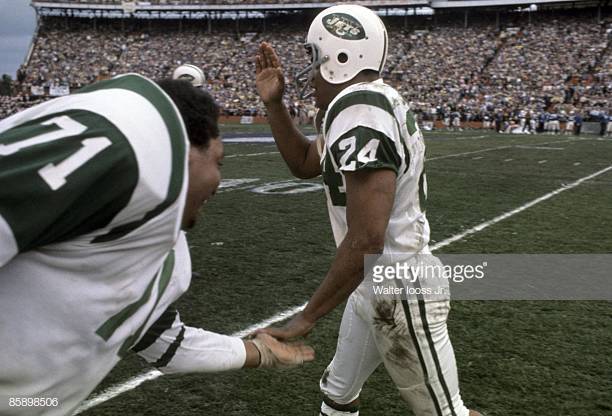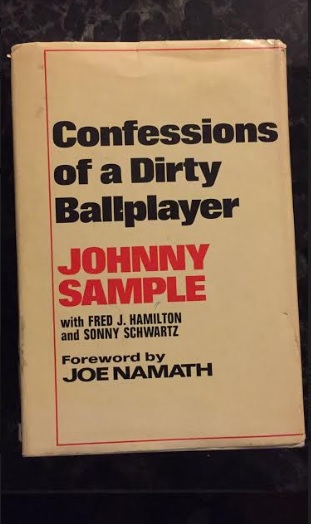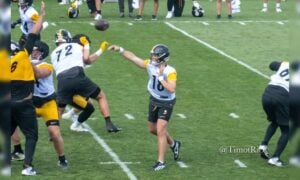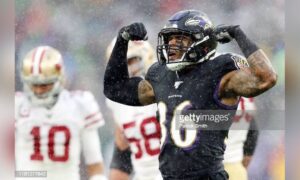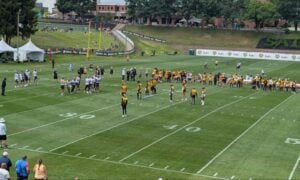Finished reading Confessions of a Dirty Ballplayer by Johnny Sample. He authored the book back in 1970 just a couple years removed from winning Super Bowl III as the New York Jets defensive captain.
Sample played college ball for Maryland State College, now University of Maryland Eastern Shore. He was the 2nd football player ever drafted from there into the NFL after Sherman Plunkett. Sadly, his alma mater that produced NFL stars like Art Shell, Carl Hairston and Emerson Boozer shut its football program down in 1979. During his years at Maryland Eastern Shore, Sample gained national recognition by being named to the Pittsburgh Courier’s First-Team All-American team in 1955 & 1957. This is what clued in NFL teams on the lookout for talent outside the normal channels.
Sample claims in his book that he was the first black player selected to play for the college all-stars who would play the prior years NFL champions. NFL legend Otto Graham coached the College All-Stars in 1958. In those days, college players by rule played on both offense and defense while the NFL had already gone to specializing with offensive & defensive platoons. Bill Nunn had recognized Sample as an All-American halfback and that is where Graham wanted him to play. Baltimore Colts head coach Weeb Ewbank projected Sample as a defensive back and wanted him to spend his couple weeks with the all-stars working on the defensive side since he would be missing valuable training camp time as a rookie. Sample went to the all-stars with his instructions which led to him riding the bench and Graham disparaging Sample to his professional coaches. Later when Sample was playing for the NFL and Graham was still coaching the all-stars, they had an altercation.
The Baltimore Colts drafted Sample in the 7th round; a pick acquired from Pittsburgh for Dick Young. Steelers coach Buddy Parker was known for trading away a lot of draft picks; in 1959 and 1963, Pittsburgh’s first pick did not occur until the 8th round due to his lack of value in building through the draft!
In his first two seasons in the NFL, Johnny Sample won two championships with the Baltimore Colts. In the 1959 season, his second he had two interceptions including a pick-6 in the championship against the New York Giants. In his 4th season, Samples was in an exhibition game against the Dallas Cowboys that took place in Norman, Oklahoma. A regular starter and used to return kicks; he missed a kickoff that resulted in a touchback which resulted in Coach Ewbank getting angry with him for not catching the ball. Samples and Ewbank got into a shouting match resulting in the coach fining him $100. Samples said that if he went through with the fine, he was through with the team since he did not see what he did wrong. Ewbank announced the fine, and Samples handed in his playbook, and a week later the Jets traded him to the Pittsburgh Steelers for a draft pick.
Johnny Sample played for the Pittsburgh Steelers in 1961 & 1962. Bobby Layne’s preseason injury sealed the fate of the Steelers 1961 season. He played hurt losing the first two games before being replaced by Rudy Bukich at quarterback. Layne would come back late in the season but could only master a 2-2 record as the Steelers finished 6-8. Although the Steelers didn’t shine as a team, Johnny Sample had a strong season as a starting cornerback and primary punt & kick returner.
He started 13 of 14 games; was 2nd in the NFL that season with eight interceptions including a pick 6. He also recovered two fumbles to record 10 turnovers for the season. He had 26 punt returns for a league leading 283 yards and a 10.9 average per return including a touchdown. He also returned 23 kickoffs averaging 23.1 yards a return. Wouldn’t it be nice to have a returner record those statistics in 2019?
He was voted as a 1st team All-Pro by the NY Daily News and UPI in 1961. However, The Associated Press (AP) ignored him as did the Pro Bowl. Ironically, his successful first season led to an early departure from Pittsburgh. In those days, very few agents represented players, so players negotiated their own contracts often with the head coach or owner.
Sample approached either Dan or Art Rooney Jr. to request a new contract before the 1962 season. He wanted a an $8000 raised over the $14000 he had made in 1961 believing it matched other high performing defensive backs. Rooney gave a counteroffer of $1500. Sample advised that he would play out his option and go elsewhere. A few weeks later during training camp, head coach Buddy Parker called Sample in to discuss his contract.
Sample states he repeated his demand for an $8000 raise citing his performance in 1961. According to Sample, Parker responded, “I know you had a great year Sample. But black athletes just don’t deserve that kind of money and I won’t pay it.” The discussion grew heated from there and Sample requested a trade or to be released as a free agent. Parker replied, “I’m not going to do either one, I’m going to keep you right here.”
It’s unclear if the Rooney’s stepped in but Sample relates that he did end up with a $6000 raise after the first game of the season. However, for Sample the damage had been done. “Buddy Parker and I had split our ways for good.” Sample hurt his back in the 6th game of the season; and Parker waived him 10 days later. The Philadelphia Eagles claimed him but using rules of the time, Parker reclaimed Sample and placed him on the reserve list effectively ending his season. Parker then traded Sample to the Washington Redskins for a draft choice.
In 1962, the Steelers ended up 9-5 with a healthy Bobby Layne available for most of the season. Sample’s back injury and subsequent removal from the roster ended his time in Pittsburgh just 6 games into his second season. He started four of the games but recorded no turnovers and had only four punt and a pair of kickoff returns after being the regular returner the year before. Could a healthy Sample who was in tune with the coach have helped the Steelers win an additional game and their second ever playoff appearance? We’ll never know.
The only thing he missed was leaving Big Daddy Lipscomb behind in Pittsburgh. They were teammates at Baltimore his rookie year. As for Parker, he said in his book that, “Buddy Parker has to be just about the all-time worst when it comes to understanding players and their problems.” Sample’s ire toward Parker was so strong that in a 1964 game as a Redskin, he scored a pick-6 against the Steelers and then “ran straight over to the Steelers bench and threw the ball at Buddy Parker’s face.” Luckily another player deflected it.
Both the Jets and the Steelers selected Emerson Boozer in 1966 during the draft wars. Boozer, who attended Sample’s alma mater, ultimately signed with New York. This was Sample’s first season with the Jets, and I wonder if he had any influence on Boozer’s choice of team.
As for his relationship with Big Daddy, it was close. He was one of the pallbearers at Big Daddy’s funeral after a reputed drug overdose. According to Sample, Lipscomb was an excessively big drinker but never did drugs. The week prior to his death, Johnny Sample says he bought a case of V.O. whiskey, Big Daddy’s favored brand which the big man consumed in vast quantities. The day of his death, Sample says he talked to Lipscomb about 4:30PM who told him, “I just got a check for $750 and I’m going out to have a little fun.” They made plans for that coming Friday.
Sample said that he heard the news the next day on the radio. He contacted Lenny Moore who told him that the news was reporting it as an overdose. Sample concludes that circumstances don’t add up. Lipscomb was afraid of needles. He also states that the three injection marks were in his right arm, but Big Daddy was right-handed which does not make sense to him if he was injecting himself. Sample’ theory was that he was “rolled” and was given the injections, but it was not intended to kill him. He mentions reports doctors believed someone had tried to revive him because when he was found outside the hospital the doctors“found marks where ice had been put between his legs and behind his neck.” Another mystery we’ll never know the full answer to.
Sample credits Big Daddy Lipscomb for a life’s lesson about the NFL. Lipscomb “believed football was a form of entertainment as much as a sport.” He told Samples, “The fans pay their money because they want a show. And the more show you put on, the more money you’re going to make.”
His playing days as a Redskin ended after the 1965 season when Bill McPeak (a former Steeler) was fired and Washington hired Sample’s old nemesis Otto Graham. He was soon on the street unable to sign up with another team. He talked to the Chicago Bears and George Halas said his assistant coach Chuck Cherundulo (a Steeler player from 1941-48) recommended him. Thinking he was now a Chicago Bear, he contacted Halas after not hearing from the team after their initial phone call only to be informed he was a free agent.
Blackballed by the NFL, Sample ended up with the New York Jets then a part of the AFL which was yet to merge with older league. Sample was back with Ewbank, his coach with the Colts that had won a championship his rookie year. He ended up the defensive captain on the Jets team quarterbacked by Joe Namath who “guaranteed” a win against the heavily favored Colts and delivered. Sample did his part including chipping in an interception that shut down a Colts drive. Sample became close enough friends with Namath for Joe to invite him with a few others to Beaver Falls for a celebration parade in his hometown.
Sample unabashedly described himself as a mouthy, hard-hitting player. Sometimes after a play was over or a receiver clearly could not make a catch he would still give them a shot. He saw intimidation as part of the defensive repertoire. He also talked a lot of smack. He wasn’t just being a loudmouth; he maintained his own rating system of opponents. He rated receivers by their relative speed, ability to run pass patterns, catching ability – including what Mike Tomlin would call combat catches – blocking ability and intimidation. He evaluated receiver’s intimidation factor by hitting them after the ball was thrown out of reach or by yelling at them. The more they reacted, the more he wolfed at them. He said that Lance Alworth was the only receiver he didn’t try to intimidate with his smack talk. “My words just didn’t make difference to him … so after our first two games I just conserved all my energy to cover him, which was a hell of a tough job in itself.”
Sample also fought for player’s ability to negotiate salaries. If he didn’t think he was being paid fairly, he made it known and if necessary, he’d walk off the job. To hedge his bets, he became a businessman with outside interests so that he was not solely dependent on football for his income. He supported other players who tried to address the inequities such as pay between white & black players at a time when the owners held much more control over the purse strings than these days of collective bargaining agreements.
Namath wrote the forward to Sample’s book saying in part, “John was always at the right place at the right time with the right thing to say. Some fans and some writers may feel he had too much to say, but the fact remains it was his teammates who elected him defensive captain, and that was what really counted with him, and with us.”
At the end of his book, Johnny Sample displayed his all-star team from amongst the players he shared the field with during his 11-year career that spanned from 1958-1968.
Quarterback: Johnny Unitas with a mention of Joe Namath
Running Back: Jim Brown followed by Lenny Moore & Hugh McElhenny
Receivers: Flanker Lance Alworth & Split End Raymond Berry
Tight End: John Mackey
Offensive Line: Tackles Jim Parker, Ron Mix & Sherman Plunkett. Guards Jerry Kramer, John Nisby & Art Spinney. Center Mick Tingelhoff
Defensive line: Defensive ends Gino Marchetti & Willie Davis. Tackles Eugene “Big Daddy” Lipscomb & Alex Karras.
Linebackers: Middle linebackers Joe Schmidt & Al Atkinson. Outside linebackers Bobby Bell & George Webster.
Cornerbacks: Dick “Night Train” Lane & Herb Adderley.
Safeties: Emlen Tunnell & Kenny Graham.
Placekicker: Lou Groza
Punter: Don Chandler
Your Music Selection
In the 2018 Memorial Day Weekend: Steelers Friday Night Five Questions, I committed to play songs that Steelers Depot respondents suggested might be the new Steelers anthem if Renegade by Styx was ever replaced. Here is entry 45 of 45 (Finally!) from James P Kelly & Yours Truly, Beaver Falls Hosiery: (I Can’t Get No) Satisfaction by the Rolling Stones.

